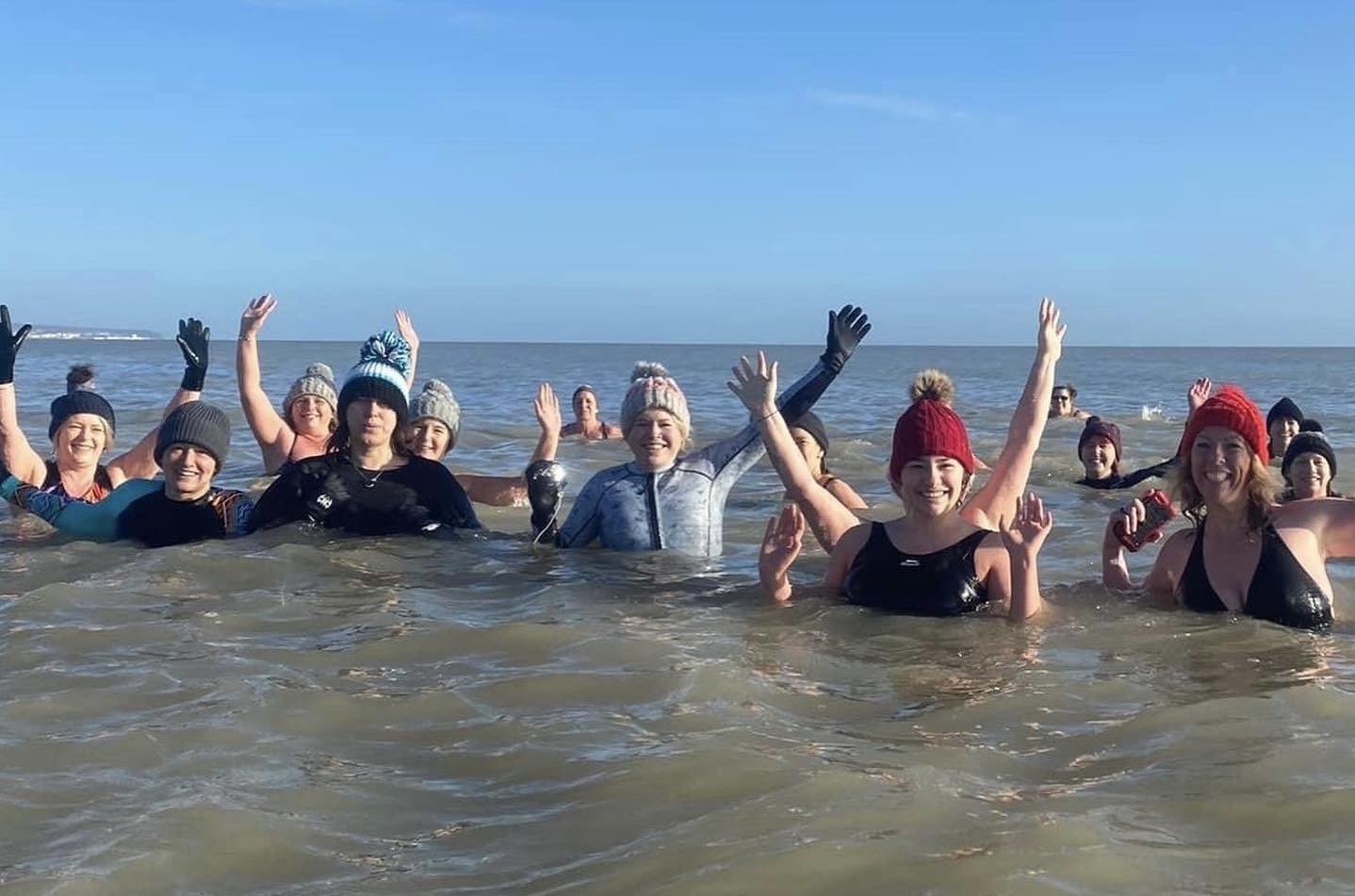
Sea Swimming With Pevensey Mental Health Swims ~ My Encounter with Cold Water Immersion
For a number of reasons we all seem to be focusing on our mental health at the moment – and why not? Normalising conversations about how we feel, be it good or bad can only be a positive step in removing any lingering stigmatism associated with how we cope with our mental health struggles. Thanks to the likes of Wim Hoff, the master of cold water therapies, natural remedies for improving mental health such as sea swimming have surged in popularity in recent months with organised meet ups popping up all over the coast line.

My Experience
Having heard about all the natural benefits a simple dip in the sea can offer I was keen to get involved. On a beautifully sunny (but extremely cold!) January Sunday I arranged to join a sea swim organised by Pevensey Mental Health Swims – part of a national network of Mental Health Swims. I joined 20 other brave souls as were prepped by our swim host, Helen on the best breathing techniques to cope with the short, sharp shock of the cold before walking into the sea en masse. The sea temperature was 8 degrees – which despite being pretty cold was actually warmer than the air.
So how did it feel? The first 20 seconds takes your breath away. The breathing techniques really help to keep you focused on something other than the cold. Once you’re in and past the initial 30 seconds it does get easier…and there is definitely a fix of buzzing exhilaration. For me the highlight was taking part in something with a group of other, like-minded people. There’s also a huge sense of satisfaction and achievement once you’re in that water. I loved the feeling of being in the moment and of extreme alertness I was left with. It did take a long time to warm up but I’d certainly do it again!

Pevensey Mental Health Swims
The Pevensey events are hosted by Helen Squires who lives in Crowborough where she also practises as a play therapist specialising in eco-therapies. Post – swim I was keen to ask Helen about the benefits of cold water therapy in more detail:

Can you explain why swimming in cold water has such a positive impact on our mental health?
Firstly, we live in a world where demands on our bodies and minds are great. We experience prolonged periods of over stimulation and activity, so our ‘base line’ stress levels are rising. What research has shown is that short ‘stresses’ on our bodies can be good for us. They help us to manage our general stress response. The initial ‘cold shock’ (which is the first 30sec- 2 mins of being in the water) is a short stress and activates our Sympathetic nervous system (SNS), causing our bodies to go into ‘fight, flight or freeze’ mode. When we can acclimatise to the water our parasympathetic nervous system (PNS) activates flooding our bodies with ‘happier’ and ‘calmer’ chemicals and moves us into a ‘rest & digest’ state. This repeated experience creates new neural connections in our brain which has shown to enable us to cope better with general stress (anxiety, depression, overwhelm etc) in our everyday lives.
Secondly, we are living in an ever increasingly fragmented and disconnected society, so peer support groups like the Mental Health Swim groups connect people. This provides a sense of community and therefore belonging which positively influences our wellbeing.

What should anyone wanting to try cold water swimming do to prepare themselves?
- You should always check with a medical professional before taking part in any cold-water immersion.
- Join a group – never swim or dip alone!
- Safety – whether you are swimming in the sea, a lake or a river you need to know how to spot if it is safe or not so this is vital preparation.
- Know what to do in an emergency situation.
- If you are sea swimming, ideally start when the water is warmer (Sept time) and dip regularly if you can. Lakes are often colder.
- Breathwork – learning to calm your nervous system by using your breath is really help full and this can be practiced before entering the water.

What kit do you need to bring for one of your swims?
Dip in whatever you feel most comfortable in. I currently dip 2-3 times a week and wear a normal bog standard swimming costume and a woollen hat, but what is right for me might not be right for you and our bodies all respond differently to the cold. At this time of year I would recommend wetsuit socks or boots and wetsuit gloves. A tow float is also recommended for safety.
Your ‘apres dip kit’ is important! You’ll need a warm towel, lots of loose warm layers (jogging bottoms not denim as denim is cold), hats, scarf, gloves, warm socks – Lots of layers! I’m fond of a hot water bottle after a dip too. Finally, a warm drink and a small sugary snack will also help your body gently recover.

How can we find out more about Mental Health Swims?
You can find out more about the charity Mental Health Swims and the work it is doing by looking on the main website www.mentalhealthswims.co.uk as there are swim groups all of the UK and further afield now. I am based at Pevensey Bay, East Sussex. You can find information about the swim meets on the Facebook page ‘Pevensey Mental Health Swims’, or via Instagram @pevensey_mentalhealthswims
Final Thoughts..
There’s no denying the immediate effects of sea swimming are wholly positive for anyone brave enough to dip their toe in. Personally, I’m more of a fan of outdoor swimming when it’s slightly warmer but I can appreciate the vast range of health benefits, including improved mental health, cold water therapies are capable of providing. I am certain I’ll take a cold water plunge again, but I might save this particular ritual for special occasions like Christmas Day when I can warm up with a hot toddy afterwards!
If you’d like to find out more about Mental Health Swims in your area please visit their website here. With thanks to Helen for her expertise, guidance and advice featured in this post.






